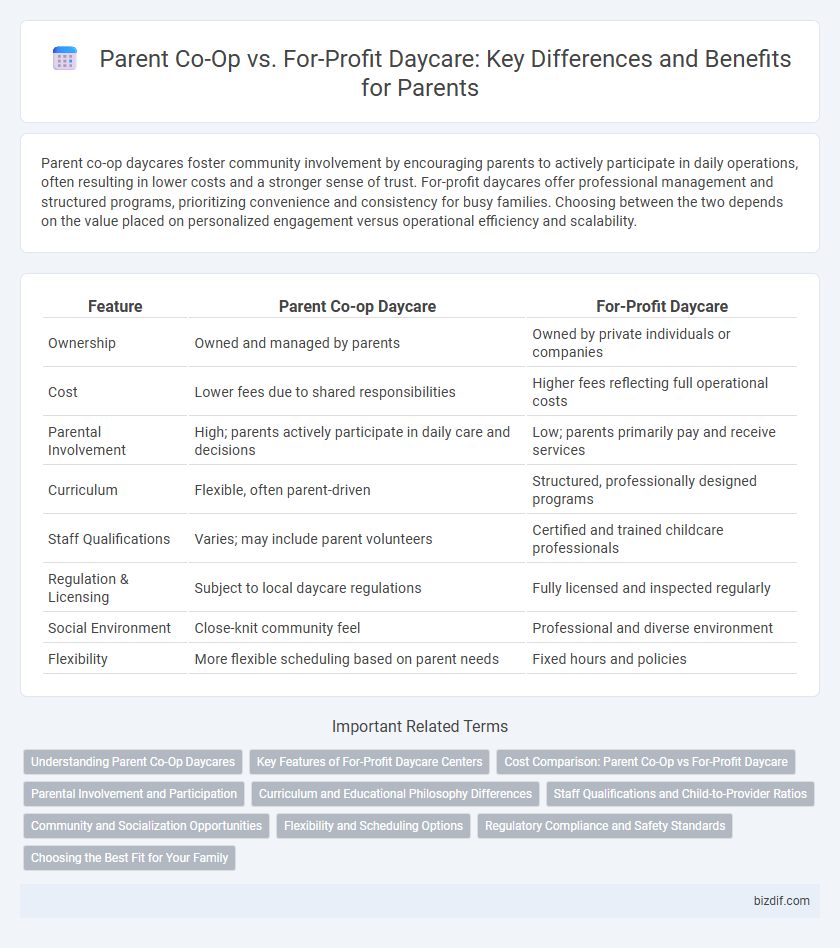Parent co-op daycares foster community involvement by encouraging parents to actively participate in daily operations, often resulting in lower costs and a stronger sense of trust. For-profit daycares offer professional management and structured programs, prioritizing convenience and consistency for busy families. Choosing between the two depends on the value placed on personalized engagement versus operational efficiency and scalability.
Table of Comparison
| Feature | Parent Co-op Daycare | For-Profit Daycare |
|---|---|---|
| Ownership | Owned and managed by parents | Owned by private individuals or companies |
| Cost | Lower fees due to shared responsibilities | Higher fees reflecting full operational costs |
| Parental Involvement | High; parents actively participate in daily care and decisions | Low; parents primarily pay and receive services |
| Curriculum | Flexible, often parent-driven | Structured, professionally designed programs |
| Staff Qualifications | Varies; may include parent volunteers | Certified and trained childcare professionals |
| Regulation & Licensing | Subject to local daycare regulations | Fully licensed and inspected regularly |
| Social Environment | Close-knit community feel | Professional and diverse environment |
| Flexibility | More flexible scheduling based on parent needs | Fixed hours and policies |
Understanding Parent Co-Op Daycares
Parent co-op daycares are community-driven childcare centers where parents actively participate in daily operations, reducing costs and fostering a collaborative environment. Unlike for-profit daycares that prioritize financial gain, parent co-ops emphasize shared responsibility and stronger parent-teacher relationships. This model often results in lower tuition fees, greater transparency, and personalized care tailored to each child's needs.
Key Features of For-Profit Daycare Centers
For-profit daycare centers operate as businesses, focusing on efficiency, professional management, and comprehensive services to attract a broad clientele. They often provide extended hours, diverse educational programs, and child development resources, supported by trained staff and licensed facilities. The fee structure in for-profit daycares is typically higher, reflecting their emphasis on quality standards and competitive amenities.
Cost Comparison: Parent Co-Op vs For-Profit Daycare
Parent co-op daycares typically offer significantly lower costs than for-profit daycares because parents contribute labor and share operational responsibilities, minimizing staffing expenses. For-profit daycares charge higher fees to cover salaries, facilities, and profit margins, resulting in greater overall monthly rates. Families seeking budget-friendly childcare often favor parent co-ops for affordable tuition compared to the premium pricing of commercial daycare centers.
Parental Involvement and Participation
Parent co-op daycares emphasize high parental involvement, requiring parents to actively participate in daily operations, decision-making, and event organization, which fosters a strong community bond and shared responsibility. For-profit daycares typically limit parental involvement to administrative communication and occasional events, focusing instead on professional staff management and consistent service delivery. This fundamental difference affects both the level of parental engagement and the overall daycare experience for families.
Curriculum and Educational Philosophy Differences
Parent co-op daycares often emphasize collaborative curriculum development, fostering community involvement and child-centered, play-based learning philosophies. For-profit daycares typically implement standardized curricula driven by educational research and outcomes, focusing on structured skill development and academic readiness. These differing approaches reflect varying priorities in educational philosophy, with co-ops valuing social-emotional growth and for-profits emphasizing measurable cognitive achievements.
Staff Qualifications and Child-to-Provider Ratios
Parent co-op daycares often have varied staff qualifications since parents typically volunteer without standardized early childhood education credentials, resulting in less consistent expertise. For-profit daycares usually employ professional early childhood educators with formal training and certifications, ensuring higher staff competency. Child-to-provider ratios tend to be lower in for-profit centers, promoting more individualized attention and enhanced child development support compared to the often higher ratios in parent co-ops.
Community and Socialization Opportunities
Parent co-op daycares foster a strong sense of community by involving families directly in operations and decision-making, enhancing social bonds among children and parents. For-profit daycares often offer structured socialization programs but may lack the personalized community engagement found in co-ops. The collaborative environment in parent co-ops promotes diverse social learning experiences that contribute to children's emotional and social development.
Flexibility and Scheduling Options
Parent co-op daycares offer greater flexibility in scheduling as parents collaborate to create customized care routines that accommodate varying work hours and family needs. For-profit daycares typically operate on fixed schedules with limited options, prioritizing standardized hours to maximize enrollment and revenue. Families seeking adaptable care solutions often prefer parent co-ops for their ability to tailor attendance around unpredictable or non-traditional work schedules.
Regulatory Compliance and Safety Standards
Parent co-op daycares often emphasize community-driven regulatory compliance, relying on active parental involvement to meet safety standards, whereas for-profit daycares are typically governed by stringent state and federal regulations with dedicated staff ensuring continuous adherence. For-profit centers usually implement formal safety protocols, regular staff training, and subject themselves to frequent inspections to maintain licensing requirements, while co-ops may vary in consistency due to differing levels of parent participation. Understanding these distinctions is crucial for parents prioritizing regulatory compliance and safety in choosing the best daycare environment.
Choosing the Best Fit for Your Family
Parent co-op daycares offer hands-on involvement, lower fees, and a community-driven environment, making them ideal for families seeking active participation and cost savings. For-profit daycares provide professional staff, structured programs, and extended hours, catering to families needing convenience and specialized services. Evaluating your family's schedule, budget, and desired level of engagement ensures selecting the best fit for your child's care and development.
Parent co-op vs for-profit daycare Infographic

 bizdif.com
bizdif.com